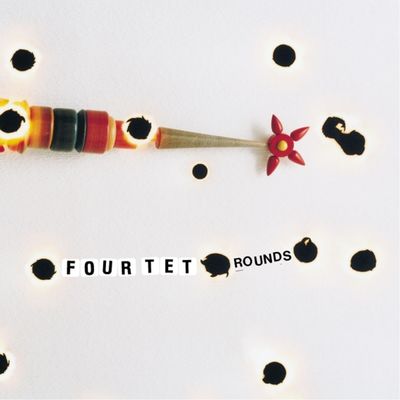Four Tet: Rounds

An appreciation of the music made by The Books is a source of much pleasure for me, but an inclination toward their complex conjunction of found-sound and exquisitely crafted acoustics was not something that came naturally; I had to be lead there, slowly and with baby steps. The first record that set me on the path was Tunng’s Comments of the Inner Chorus; intrigued by the ‘folktronica’ tag, their naïve juxtaposition of singer-songwriter tunesmithery and electronic noodling was just enough to make me overcome my innate distrust of any music made primarily with a computer.
Tunng pointed me in the rough direction, but it would take something more nuanced, more abstract, to divorce my tastes from the need to hear a ‘tune’ and for a song to have lyrics and structure and narrative. Further digging into the ‘folktronica’ scene led, inevitably, to Keiran Hebden’s much lauded project, Four Tet. Much like ‘emo’ in the early naughties, ‘folktronica’ was a tag that those to whom it most applied were those most eager to disassociate themselves from it. Nevertheless, no matter who you asked or who you read, the whole acoustic-electronica ‘thing’ led back to Four Tet’s seminal album, Rounds.
This month sees the tenth anniversary of the release of Rounds, and to commemorate the occasion Domino have re-released the album in an impressive double-vinyl set, and in doing so have given me all the reason I need to immerse myself once again in this absolute gem of an LP. Many’s the happy evening I whiled away engrossed in the intricacies and subtleties of Rounds. For a time the concept of a ‘chill out’ record was something every supermarket compilation was trying to cash in on, and where they generally failed to live up to the concept, Rounds does so in spades. To call this music ‘chill out’ perhaps does it a disservice, as it is most definitely music to actively listen to, but there’s no denying that hearing this album is a profoundly relaxing experience.
I found it surprising just how much the act of listening to it on vinyl changed the experience. Generally I've found the process of flipping the disc midway serves to highlight the attention that needs to be shown to the music, but Rounds is not a long record, and spreading it over two discs — effectively introducing three forced pauses into the experience — serves only to break the reverie. This, then, is one of the few records I actually prefer to listen to on CD. Mercifully the record is so good, and such an important stepping stone in my musical development, that I don’t begrudge having bought it twice.